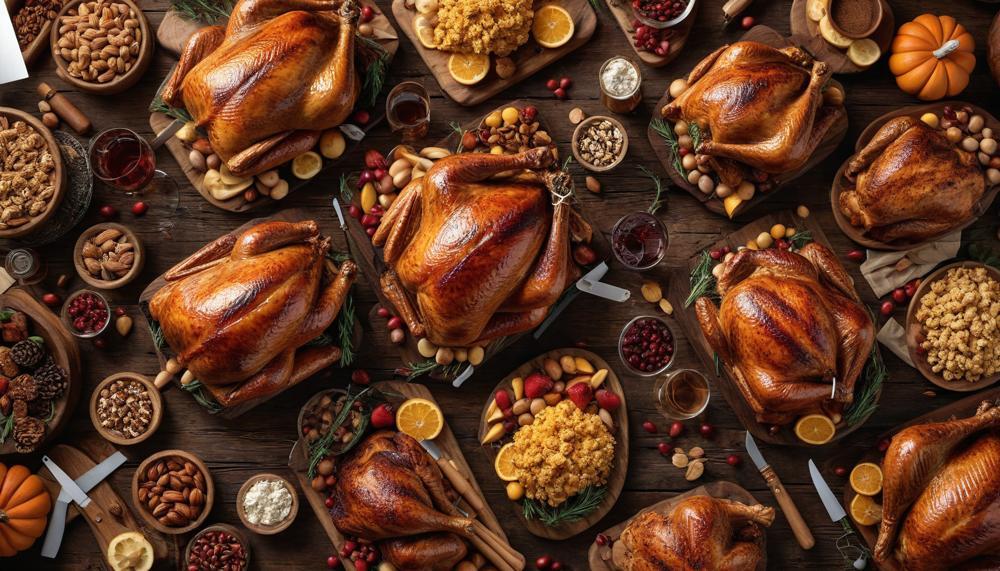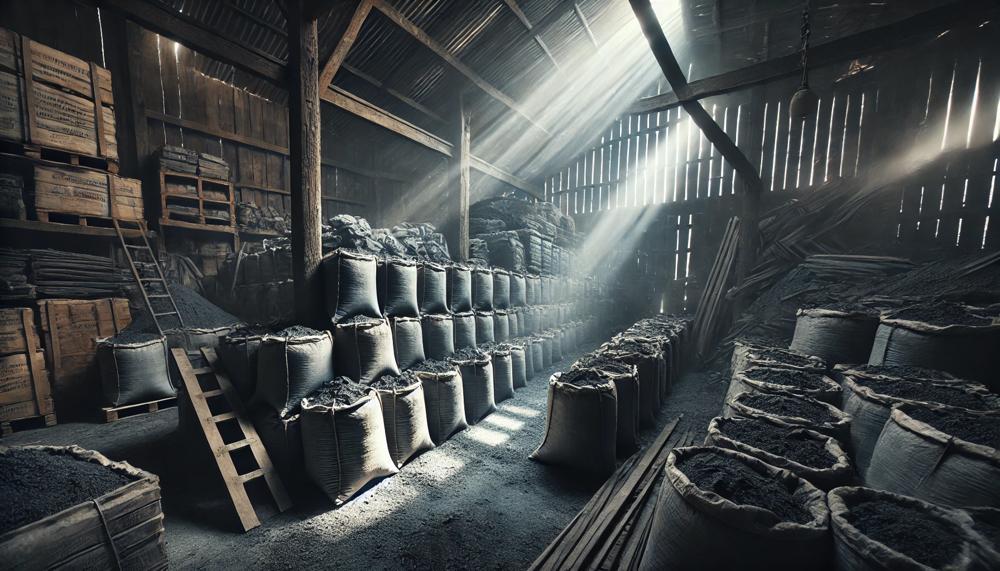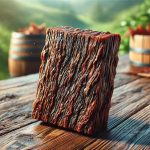When thinking about smoking a turkey, choosing the right wood is crucial to achieving that perfect balance of flavor and aroma. The best wood for smoking a turkey? Cherry wood tops the list, offering a subtle sweetness that enhances the meat without overpowering it.
The rich color it imparts is an added bonus. If you’re aiming for a blend of sweet and smoky, pecan wood chips are your go-to, delivering a flavor profile that complements turkey wonderfully.
While applewood is often favored, its mildness can extend cooking times, risking dryness. Avoid certain hardwoods that might overpower the delicate turkey flavor.
Key takeaways:
- Cherry Wood: Adds a touch of sweetness and beautiful color.
- Pecan Wood Chips: Provides a sweet, smoky flavor that enriches the turkey.
- Applewood: Popular but can take longer to infuse, risking dryness.
- Avoid Strong Hardwoods: To prevent overpowering the turkey’s natural taste.
Contents
Best Woods For Smoking A Turkey
When it comes to smoking a turkey, the choice of wood can make or break your dish. Here are some top woods recommended for smoking turkey, along with explanations for their popularity:
| Wood Type | Flavor Profile | Notes |
| Cherry | Mild and fruity | Cherry wood adds a touch of sweetness without overpowering the meat, imparting a rich, deep color to the turkey. |
| Apple | Subtle and sweet | Applewood provides a delicate, sweet flavor but can take longer to infuse, requiring careful monitoring to prevent drying out the meat. |
| Pecan | Sweet and nutty | Pecan wood offers a sweet, smoky flavor that complements the turkey’s natural taste, making it a popular choice for a balanced and delicious outcome. |
Additional Recommendations:
- Hickory: While hickory is a favorite for many smoked meats, it can be too strong for turkey, potentially overwhelming its delicate flavor.
- Mesquite: Mesquite’s intense smokiness is generally considered too harsh for turkey, often resulting in a bitter taste.
Are There Any Types Of Wood To Avoid For Smoking Turkey?
When smoking a turkey, it’s crucial to avoid certain types of wood that can overpower its delicate white meat. Here’s a breakdown to help you choose the right wood for smoking:
| Wood Type | Reason to Avoid | Alternative Recommendation |
| Hickory | Has a strong, robust flavour that can overwhelm the mild taste of turkey. | Pecan wood provides a similar smoky flavour without overpowering the meat. |
| Mesquite | Very intense and can make turkey taste bitter if used excessively. | Cherry wood offers a balanced sweetness and is gentler on the turkey’s flavour. |
| Black Walnut | Produces a bitter smoke that can ruin the turkey’s taste. | Apple wood gives a lighter, sweeter flavour that complements turkey well. |
These hardwoods should be avoided when smoking turkey to ensure the meat’s natural flavours shine through. Opt instead for woods like pecan, cherry, or apple for a balanced and delicious outcome. Always consider the intensity of the wood’s flavour to enhance your smoking experience without overwhelming the turkey’s delicate taste.
For more detailed guidance on smoking woods, you can check out resources like Smoked BBQ Source.
Make Your Own Smoking Wood Blend for Turkey
Crafting the perfect smoking wood blend for turkey requires a deft balance of flavours and an understanding of how different woods impact the taste and texture of the meat. Here are the key considerations:
- Wood Type: Opt for woods that complement the mild flavour of turkey without overwhelming it. Woods like cherry, apple, and pecan are top choices because they provide a mild, sweet smoke that enhances rather than masks the natural flavour of the turkey.
- Combination: Combining different woods can create a complex flavour profile. For instance, mixing applewood, which imparts a subtle sweetness, with a small amount of hickory can introduce a hint of robustness without becoming too dominant.
- Proportion: The ratio of strong to mild woods is crucial. Too much of a potent wood like hickory or mesquite can overpower the turkey. A good rule of thumb is to use a higher proportion of milder woods and sprinkle in stronger woods sparingly.
- Moisture Content: Ensure the wood is adequately dried but retains some moisture for optimal smoke production. This balance helps in creating a smooth, consistent smoke that adheres well to the turkey, enhancing its flavour.
- Experimentation: Every smoking session is a chance to tweak and refine your blend. Start with smaller batches of experimental blends to see what combinations and proportions work best with your specific smoker and turkey size.
Below is a table that outlines some effective wood blends you might consider, along with their characteristics:
| Wood Type | Flavour Profile | Best For |
| Cherry | Sweet, mild | Main base for a balanced blend |
| Apple | Very mild, fruity | Combining with stronger woods |
| Hickory | Strong, bacon-like | Used sparingly for depth |
What Kind Of Smoker Should I Smoke Turkey On?
| Smoker Type | Advantages | Disadvantages |
| Offset Smoker | Provides authentic smoky flavor, spacious cooking chamber for large turkeys. | Requires more attention to maintain consistent temperature and smoke. |
| Kamado Grill | Excellent heat retention, versatile for smoking and grilling. | Can be pricey, learning curve for temperature control. |
| Electric Smoker | Easy to use with precise temperature control, set-it-and-forget-it convenience. | Less traditional smoke flavor compared to charcoal or wood smokers. |
| Propane Smoker | Convenient and quick to set up, good temperature control. | May lack the depth of smoky flavor compared to wood smokers. |
| Pellet Smoker | Automated wood pellet feeding for consistent smoke, versatile. | May be expensive, requires access to wood pellets. |
The ideal smoker for smoking turkey depends on your preference for flavor, convenience, and cooking style. If you prioritize traditional smoky flavor and are comfortable with tending to the smoker, an offset smoker is a great choice.
For those seeking ease of use without compromising on taste, an electric smoker offers precise temperature control. Kamado grills provide versatility for both grilling and smoking, albeit with a learning curve. Propane smokers are convenient and quick, while pellet smokers automate the smoking process but can be costly.

Conclusion
Choosing the right wood for smoking a turkey is key to unlocking the best flavors and aromas for your holiday feast. If you’re seeking a wood that enhances the turkey with a mild, sweet smoke without overpowering it, cherry wood is your top choice. This wood not only imparts a subtle sweetness but also enhances the turkey’s appearance with a beautiful color.
For those who appreciate a hint of nuttiness alongside the smoke, pecan wood is a fantastic option. It delivers a rich, sweet smokiness that complements the turkey perfectly, ensuring your meal is as delicious as it is memorable.
While applewood is a popular choice for its gentle, sweet flavor, it requires careful monitoring as its mildness can extend cooking times, potentially drying out the meat. Therefore, it’s crucial to balance the smoke and keep a watchful eye.
To avoid overwhelming the delicate flavors of turkey, steer clear of heavy hitters like hickory and mesquite, which can dominate rather than enhance the meat’s natural taste. Instead, experiment with blending milder woods like apple and cherry to achieve a balanced, complex flavor profile that makes your smoked turkey the star of the show.






